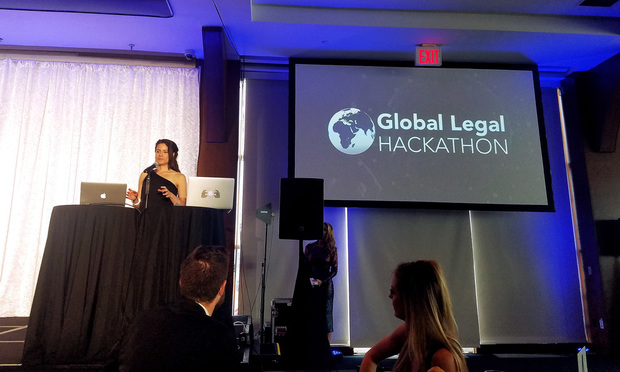Privacy Rights, Law Accessibility Win Big at Global Legal Hackathon Finale
The winning teams at the hackathon event focused on promoting user privacy and making the law more understandable to the everyday consumer.
April 23, 2018 at 02:00 PM
5 minute read
The original version of this story was published on Legal Tech News
 Aileen Schultz, co-founder of the Global Legal Hackathon, kicks off the final and third round of the competition in New York. Photo Credit: Rhys Dipshan/ALM
Aileen Schultz, co-founder of the Global Legal Hackathon, kicks off the final and third round of the competition in New York. Photo Credit: Rhys Dipshan/ALM
The third and final round of the first ever Global Legal Hackathon—a legal tech development competition that boasted participants from across five continents and over 40 cities—concluded in New York on April 21. From among the 14 finalists, who had to present live prototypes of their solution to the events' judges, four winning teams were selected, two of which developed solutions to serve the private sector, and two for the public sector.
Winners from the private sector category included Budapest, Hungary-based Revealu, an app through which users can request their personal data from tech providers, and Denver-based LexLucid, an online website where attorneys review and grade online consumers contracts, such as terms of services, to help consumers understand their agreements.
From the public sector category, Hong Kong-based Decoding Law, a machine-learning powered browser extension to help users wade through local legislation and RightsNow, a legal knowledge repository accessible through voice services like Apple's Siri, Amazon's Alexa or Google Home, also came out on top.
The private sector solutions focused on helping to protect and promote consumer privacy during a time when many are concerned about their online rights and personal data. Marton Elodi, a developer and part of the team that created Revealu, noted that the app “acts like a middleman between companies and users to help users exercise their rights” under the European Union's General Data Protection Regulation. The regulation, which comes into effect on May 25, mandates that companies turn over all data they have on EU users upon request.
Elodi added that the app works both for companies and their users alike. It is an “off the shelf product that companies can use to provide the data to consumers” as well as a data portal for consumers themselves, he said.
LexLucid also took a broad approach to privacy with their app, which seeks to enable “consumers to make educated decisions online and encourage businesses to make their contracts fair,” said Otto Hanson, attorney at Davis Graham & Stubbs and founder of LexLucid.
Though the solution relies on the manual review of contracts by registered attorneys, in the long term, the goal is to automate more of the process. Hanson noted the “hope is that artificial intelligence and machine learning algorithms will be able to do a lot of the contract grading for us, but that is very complex work for AI algorithms and we are just not there yet,” he added.
At the other end of the spectrum, the public sector solutions focused on making the law more transparent and understandable to everyday consumers.
The Decoding Law team, for example looked to help Hong Kong locals find and understand their city's legislation. The proposed solution, which the Hong Kong Department of Justice expressed interests in, “is essentially a chrome plug-in where you enter in your situation and questions and we will find you the exact provision under the legislation” to help, said Alison (Pui Wun) Li, a student at the University of Hong Kong, and part of the team that developed Decoding Law.
The solution functions as an AI-powered chatbot that helps find relevant legal provisions. It also allows users to highlight relevant provisions in legislation text, and has a sentence structure analysis feature that helps translate the complex legalese of highlighted provisions into easy to understand language.
RightsNow is also working on making legal information easier to find and comprehend. The app “saves time by not having to shift through all the information that Google will provide,” Matthew “Zeke” Hughes, senior director of business development at Mindcrest Inc., and co-founder of the app, previously told Legaltech News.
Maximilian Paterson, senior director of education and community programs at Neota Logic and the other co-founder of RightsNow also told Legaltech News that the aim of the app was to have a more seamless channel through which to access legal knowledge. Through voice services, “you can actually give law information on a very human level and it's accessible. So it's not only access to justice, but accessibility to justice as well.”
After the end of the Global Legal Hackathon, the winning teams were optimistic about the future, and wanted to hit the ground running on further developing their application.
“I think this is a really huge encouragement for us to seriously consider out next step, to go back home to discuss with our potential partners and seriously think about and submitting applications for funding to make this idea realized,” Decoding Law's Li said.
Likewise, LexLucid planned to figure out how best to expand their prototype. “We're going to launch a crowdfunding campaign probably over the next three or four months and use that crowdfunding campaign to test the market to see if this is something that consumers want,” Hanson said.
➤➤ Want to read more about how new tech is changing the legal profession? Sign up for What's Next, a weekly email briefing on the future of law.
This content has been archived. It is available through our partners, LexisNexis® and Bloomberg Law.
To view this content, please continue to their sites.
Not a Lexis Subscriber?
Subscribe Now
Not a Bloomberg Law Subscriber?
Subscribe Now
NOT FOR REPRINT
© 2025 ALM Global, LLC, All Rights Reserved. Request academic re-use from www.copyright.com. All other uses, submit a request to [email protected]. For more information visit Asset & Logo Licensing.
You Might Like
View All
'You Can’t Do a First Draft of Common Sense': Microsoft GC Jon Palmer Talks AI, Litigation, and Leadership

'Everything Leaves a Digital Footprint': How to Navigate the Complexities of Internal Investigations
5 minute read
Shareholder Activists Poised to Pounce in 2025. Is Your Board Ready?

Old Laws, New Tricks: Lawyers Using Patchwork of Creative Legal Theories to Target New Tech
Trending Stories
- 1'Shame on Us': Lawyer Hits Hard After Judge's Suicide
- 2Upholding the Integrity of the Rule of Law Amid Trump 2.0
- 3Connecticut Movers: New Laterals, Expanding Teams
- 4Eliminating Judicial Exceptions: The Promise of the Patent Eligibility Restoration Act
- 5AI in Legal: Disruptive Potential and Practical Realities
Who Got The Work
J. Brugh Lower of Gibbons has entered an appearance for industrial equipment supplier Devco Corporation in a pending trademark infringement lawsuit. The suit, accusing the defendant of selling knock-off Graco products, was filed Dec. 18 in New Jersey District Court by Rivkin Radler on behalf of Graco Inc. and Graco Minnesota. The case, assigned to U.S. District Judge Zahid N. Quraishi, is 3:24-cv-11294, Graco Inc. et al v. Devco Corporation.
Who Got The Work
Rebecca Maller-Stein and Kent A. Yalowitz of Arnold & Porter Kaye Scholer have entered their appearances for Hanaco Venture Capital and its executives, Lior Prosor and David Frankel, in a pending securities lawsuit. The action, filed on Dec. 24 in New York Southern District Court by Zell, Aron & Co. on behalf of Goldeneye Advisors, accuses the defendants of negligently and fraudulently managing the plaintiff's $1 million investment. The case, assigned to U.S. District Judge Vernon S. Broderick, is 1:24-cv-09918, Goldeneye Advisors, LLC v. Hanaco Venture Capital, Ltd. et al.
Who Got The Work
Attorneys from A&O Shearman has stepped in as defense counsel for Toronto-Dominion Bank and other defendants in a pending securities class action. The suit, filed Dec. 11 in New York Southern District Court by Bleichmar Fonti & Auld, accuses the defendants of concealing the bank's 'pervasive' deficiencies in regards to its compliance with the Bank Secrecy Act and the quality of its anti-money laundering controls. The case, assigned to U.S. District Judge Arun Subramanian, is 1:24-cv-09445, Gonzalez v. The Toronto-Dominion Bank et al.
Who Got The Work
Crown Castle International, a Pennsylvania company providing shared communications infrastructure, has turned to Luke D. Wolf of Gordon Rees Scully Mansukhani to fend off a pending breach-of-contract lawsuit. The court action, filed Nov. 25 in Michigan Eastern District Court by Hooper Hathaway PC on behalf of The Town Residences LLC, accuses Crown Castle of failing to transfer approximately $30,000 in utility payments from T-Mobile in breach of a roof-top lease and assignment agreement. The case, assigned to U.S. District Judge Susan K. Declercq, is 2:24-cv-13131, The Town Residences LLC v. T-Mobile US, Inc. et al.
Who Got The Work
Wilfred P. Coronato and Daniel M. Schwartz of McCarter & English have stepped in as defense counsel to Electrolux Home Products Inc. in a pending product liability lawsuit. The court action, filed Nov. 26 in New York Eastern District Court by Poulos Lopiccolo PC and Nagel Rice LLP on behalf of David Stern, alleges that the defendant's refrigerators’ drawers and shelving repeatedly break and fall apart within months after purchase. The case, assigned to U.S. District Judge Joan M. Azrack, is 2:24-cv-08204, Stern v. Electrolux Home Products, Inc.
Featured Firms
Law Offices of Gary Martin Hays & Associates, P.C.
(470) 294-1674
Law Offices of Mark E. Salomone
(857) 444-6468
Smith & Hassler
(713) 739-1250








